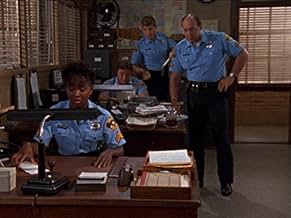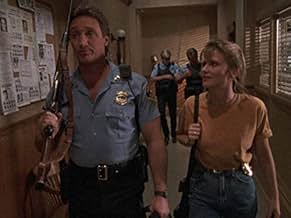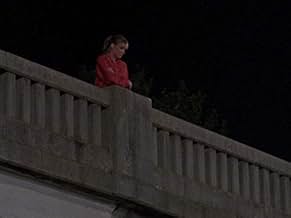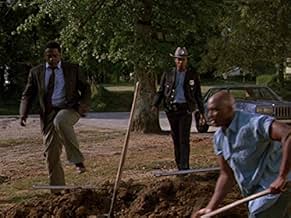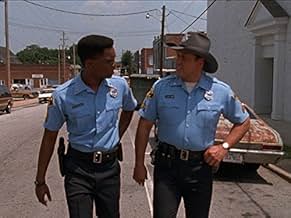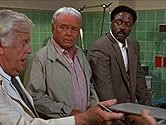Les cas et les aventures des forces de police dans et autour de Sparte, Mississippi.Les cas et les aventures des forces de police dans et autour de Sparte, Mississippi.Les cas et les aventures des forces de police dans et autour de Sparte, Mississippi.
- Récompensé par 1 Primetime Emmy
- 4 victoires et 11 nominations au total
Parcourir les épisodes
Avis à la une
I remember watching the last season on CBS, then later catching re-runs on TNT. This show is amazing, with many memorable shows that caught my attention and didn't let go until the show was over. Many great performances by actors who sadly disappeared or were stuck in guest appearances after this show.
Basically, the "In the Heat of the Night" show picks up where the 1967 series ended (with some minor plot changes, and the show was updated to the times). Chief Gillespie (Carroll O'Connor) is much more comical and light-hearted than the 1967 character. Virgil Tibbs (Howard Rollins) has settled in Sparta and brings his wife, Althea (Anne-Marie Johnson) along. There are also many stand-out characters in the police department, including Bubba Skinner (Alan Autry), Parker Williams (David Hart), Lonnie Jamison (Hugh O'Connor), Wilson Sweet (Geoffrey Thorne), and Luanne Corbin (Crystal R. Fox). This show also broke ground by introducing Harriet DeLong (Denise Nicholas), who becomes involved in a relationship with Gillespie.
This show presented the south (and the police) very well, and consistently produced shows that kept your attention - even to the very end. There was also an element of comedy to each episode, that helped the show not to be dragged down to the over-dramatic. But, the comedy also doesn't make the show overly corny or stupid.
Everyone in the cast contributed great, consistent performances. It's a shame that most of the cast couldn't find work after this show.
Hugh O'Connor (Carroll's adopted son) committed suicide only months after the show was canceled.
Howard Rollins died shortly after the show was taken off the air from cancer.
Carroll O'Connor left acting for a few years, making guest appearances once in awhile, and died of a heart attack in 2001.
Anne-Marie Johnson has done several voice-overs, and I remember seeing her in a telemovie, 'Asteroid', a few years back. Other than a recurring roll on the now-canceled TV show, 'Grace Under Fire', Alan Autry, has disappeared. David Hart, Geoffrey Thorne, Denise Nicholas, and Crystal Fox have also disappeared after this show.
In the Heat of the Night was a great show. It was also a seemingly cursed show. None of the actors have gone on to "bigger and better things". And three have since died. R.I.P. TNT still re-runs this show, so, if you catch it, I recommend you watch the show. You won't be disappointed.
Rating: 9/10
Basically, the "In the Heat of the Night" show picks up where the 1967 series ended (with some minor plot changes, and the show was updated to the times). Chief Gillespie (Carroll O'Connor) is much more comical and light-hearted than the 1967 character. Virgil Tibbs (Howard Rollins) has settled in Sparta and brings his wife, Althea (Anne-Marie Johnson) along. There are also many stand-out characters in the police department, including Bubba Skinner (Alan Autry), Parker Williams (David Hart), Lonnie Jamison (Hugh O'Connor), Wilson Sweet (Geoffrey Thorne), and Luanne Corbin (Crystal R. Fox). This show also broke ground by introducing Harriet DeLong (Denise Nicholas), who becomes involved in a relationship with Gillespie.
This show presented the south (and the police) very well, and consistently produced shows that kept your attention - even to the very end. There was also an element of comedy to each episode, that helped the show not to be dragged down to the over-dramatic. But, the comedy also doesn't make the show overly corny or stupid.
Everyone in the cast contributed great, consistent performances. It's a shame that most of the cast couldn't find work after this show.
Hugh O'Connor (Carroll's adopted son) committed suicide only months after the show was canceled.
Howard Rollins died shortly after the show was taken off the air from cancer.
Carroll O'Connor left acting for a few years, making guest appearances once in awhile, and died of a heart attack in 2001.
Anne-Marie Johnson has done several voice-overs, and I remember seeing her in a telemovie, 'Asteroid', a few years back. Other than a recurring roll on the now-canceled TV show, 'Grace Under Fire', Alan Autry, has disappeared. David Hart, Geoffrey Thorne, Denise Nicholas, and Crystal Fox have also disappeared after this show.
In the Heat of the Night was a great show. It was also a seemingly cursed show. None of the actors have gone on to "bigger and better things". And three have since died. R.I.P. TNT still re-runs this show, so, if you catch it, I recommend you watch the show. You won't be disappointed.
Rating: 9/10
This was without a doubt one of the best TV shows to ever depict the South the way it needed to be shown during the latter part of late 80's and continue into the mid-90's. This was in fact a worthy successor to the 1967 Oscar winning film of the same title. Its extremely rare these days to find a film-to-TV spin off that actually works on its own formula(the last show to accomplished such a feat and excel was MASH),and it does just that. It has an originality of its own--and it is sometimes quirky(since this set in the fictional Southern town of Sparta,and sometimes it can be downright eccentric)in the way that ordinary people act under circumstances in extraordinary situations. But in point,it taught us about the racial prejudices and as well as real life situations courtesy of its teacher and executive producer of the series....CARROLL O'CONNOR. It shows how racial problems can be solved,and also shows us that for one how drugs and drinking as well as abuse can tear a family apart and how to deal with those issues(several episodes consisted of the subject dealt with this brilliantly,including one scene where suicide was a major factor). It shows how a police force was very concerned with the community and what made it so good was that they were were not so caring but they knew what the community and its people were going through in a time of crisis. In other words,the police cared what was going on regardless of came about. Also,to make this statement....Carroll O'Connor is the ONLY actor in Hollywood who spoke out about the abuse of drugs in the community(he stepped out of character in one episode to speak about that which brought me to tears),and his show dealt with that exceptionally well. As the show made the switched from NBC to CBS in 1993,the show stayed focus on issues,but it also was the first to show an interracial marriage between characters. At its best it showed the all out emotions of the human condition,but its still is a beautifully produced show. Kudos to the late Howard Rollins,and Carroll O'Connor. R.I.P.
This show starring Carroll O'Connor is one of the best shows done for TV. Every show taught you a lesson about real life in the south. It showed racial problems and how they could be solved; it showed how drugs and drinking can tear a family apart and how to deal with it. It showed a police force so caring and understanding of what people go through. This is a tv show that was made from a movie and it will go on and on in reruns because it was done so well. Again we have to thank CARROLL O'CONNOR for doing such a great job.
Though most will forever remember O'Conner for his Emmy-winning turn as "Archie Bunker" in the classic "All in the Family," his last television role on the long-running "In the Heat of the Night" was still equally as memorable. Inspired by the Oscar-winning film, starring Rod Steiger and Sidney Poitier, the show dealt with the police force of the mythical town of Sparta, Missisippi, headed by Chief Bill Gillespie with transplanted Philedelphian Virgil Tibbs, new and black to a force that was unprepared for such a high-ranking black. Though the first couple of episodes dealt with the adjustments that had to made with the new man on the force, the racial tension in the department was soon eliminated as both The Chief and Tibbs, along with other policemen (the superb Alan Artry as "Bubba," David Hart as the down-home, tea-drinking "Parker," Geoffrey Horne" and Hugh O'Conner as the young cops, "Sweet" and "Lonnie Jameson," respectively) came to respect and trust each other.
Many of the shows dealt with timely topics as A.I.D.S., spousal abuse, rape, and corrupt politicians. One of the series' most powerful episodes is "A Trip Upstate," wherein Chief Gillespie is asked to attend the execution of a criminal (guest star Paul Benjamin) that he caught years before. The riveting execution is quite detailed and the dialog-less performances by O'Conner and Benjamin are Emmy-worthy. The eye contact between the two actors is unbelievably intense. Whether one is pro or con on the topic of capital punishment, this particular installment should have some effect, one way or the other.
Many of the shows dealt with timely topics as A.I.D.S., spousal abuse, rape, and corrupt politicians. One of the series' most powerful episodes is "A Trip Upstate," wherein Chief Gillespie is asked to attend the execution of a criminal (guest star Paul Benjamin) that he caught years before. The riveting execution is quite detailed and the dialog-less performances by O'Conner and Benjamin are Emmy-worthy. The eye contact between the two actors is unbelievably intense. Whether one is pro or con on the topic of capital punishment, this particular installment should have some effect, one way or the other.
21 years after Rod Steiger won an Academy Award as gum chewing police chief Bill Gillespie of Sparta Mississippi and Sidney Poitier told the world that in his city, THEY CALL ME MISTER TIBBS, the film was adapted into a successful television series about the new American South.
If you remember in the film Rod Steiger has the murder of a rich northern industrialist on his hands and reluctantly uses the expertise of visiting homicide detective Sidney Poitier to solve the murder. Now years later, Virgil Tibbs formerly of the Philadelphia PD Homicide Squad and now played by Howard E. Rollins, Jr. has responded to an offer from Chief Gillespie. Gillespie is now Carroll O'Connor and has made a place for Tibbs on the Sparta, PD as a newly made detective. Rollins IS the Detective Division of the Sparta, PD.
Because this show clicked so well these characters were fully developed over the seven year run of the series. We got to know everybody in the small town of Sparta, Mississippi and even the most minute characters were three dimensional, the writing on this show was so good. O'Connor alluded to his racist past and we saw a man in Chief Gillespie who was a work in progress. In the end he fell in love with black city council member Denise Nicholas.
Rollins had to adjust too, things don't quite work the same way in Sparta, Mississippi as they do in Philadelphia. And I'm not speaking necessarily of racial attitudes. Alan Autry played Bubba Skinner and he was something of a protégé of O'Connor's and he thought he ought to have been the detective. He was not a stupid guy either by any means. He and Rollins gradually developed a working relationship over the course of the show.
Gunsmoke was the first show to put the main characters within the context of the town they lived in. Beyond James Arness and the other principal cast members, Dodge City had a nice group of recurring regular citizens. That was nothing though like Sparta, Mississippi. Watching In The Heat Of The Night was like taking residence in that town for an hour each week.
In The Heat Of The Night was television series at its best, sad that it came to an end because of the health and other problems of its two lead cast members. It could still be running today.
If you remember in the film Rod Steiger has the murder of a rich northern industrialist on his hands and reluctantly uses the expertise of visiting homicide detective Sidney Poitier to solve the murder. Now years later, Virgil Tibbs formerly of the Philadelphia PD Homicide Squad and now played by Howard E. Rollins, Jr. has responded to an offer from Chief Gillespie. Gillespie is now Carroll O'Connor and has made a place for Tibbs on the Sparta, PD as a newly made detective. Rollins IS the Detective Division of the Sparta, PD.
Because this show clicked so well these characters were fully developed over the seven year run of the series. We got to know everybody in the small town of Sparta, Mississippi and even the most minute characters were three dimensional, the writing on this show was so good. O'Connor alluded to his racist past and we saw a man in Chief Gillespie who was a work in progress. In the end he fell in love with black city council member Denise Nicholas.
Rollins had to adjust too, things don't quite work the same way in Sparta, Mississippi as they do in Philadelphia. And I'm not speaking necessarily of racial attitudes. Alan Autry played Bubba Skinner and he was something of a protégé of O'Connor's and he thought he ought to have been the detective. He was not a stupid guy either by any means. He and Rollins gradually developed a working relationship over the course of the show.
Gunsmoke was the first show to put the main characters within the context of the town they lived in. Beyond James Arness and the other principal cast members, Dodge City had a nice group of recurring regular citizens. That was nothing though like Sparta, Mississippi. Watching In The Heat Of The Night was like taking residence in that town for an hour each week.
In The Heat Of The Night was television series at its best, sad that it came to an end because of the health and other problems of its two lead cast members. It could still be running today.
Le saviez-vous
- AnecdotesThe season 7 episode "Every Man's Family" was meant as the pilot for a proposed spinoff for the character of Bubba Skinner. The network did not have any available slots at the time it was first broadcast and In the Heat of the Night ended soon after, so the spinoff never materialized. It would have been set in Atlanta.
- GaffesIn the final season, all of the major long time characters are now senior police officers holding the ranks of Sergeant through Captain. In most every police department, these are "desk jobs" which hardly ever leave the police station, yet in order to keep the action with the main characters, the show has these senior police officials performing routine tasks such as street patrol and first responding to crimes.
- Citations
Virgil Tibbs: I want to like you people; and I want you people to like me. But there can't be liking without respect, and until there is that respect you will call me MISTER TIBBS!
- ConnexionsFeatured in The 41st Annual Primetime Emmy Awards (1989)
- Bandes originalesIn the Heat of the Night
Music by Quincy Jones
Lyrics by Alan Bergman and Marilyn Bergman
Arranged by Christopher Page (as Chris Page)
Performed by Bill Champlin
Meilleurs choix
Connectez-vous pour évaluer et suivre la liste de favoris afin de recevoir des recommandations personnalisées
- How many seasons does In the Heat of the Night have?Alimenté par Alexa
Détails
- Date de sortie
- Pays d’origine
- Site officiel
- Langue
- Aussi connu sous le nom de
- In der Hitze der Nacht
- Lieux de tournage
- Sociétés de production
- Voir plus de crédits d'entreprise sur IMDbPro
Contribuer à cette page
Suggérer une modification ou ajouter du contenu manquant

Lacune principale
By what name was In the Heat of the Night (1988) officially released in India in Hindi?
Répondre

